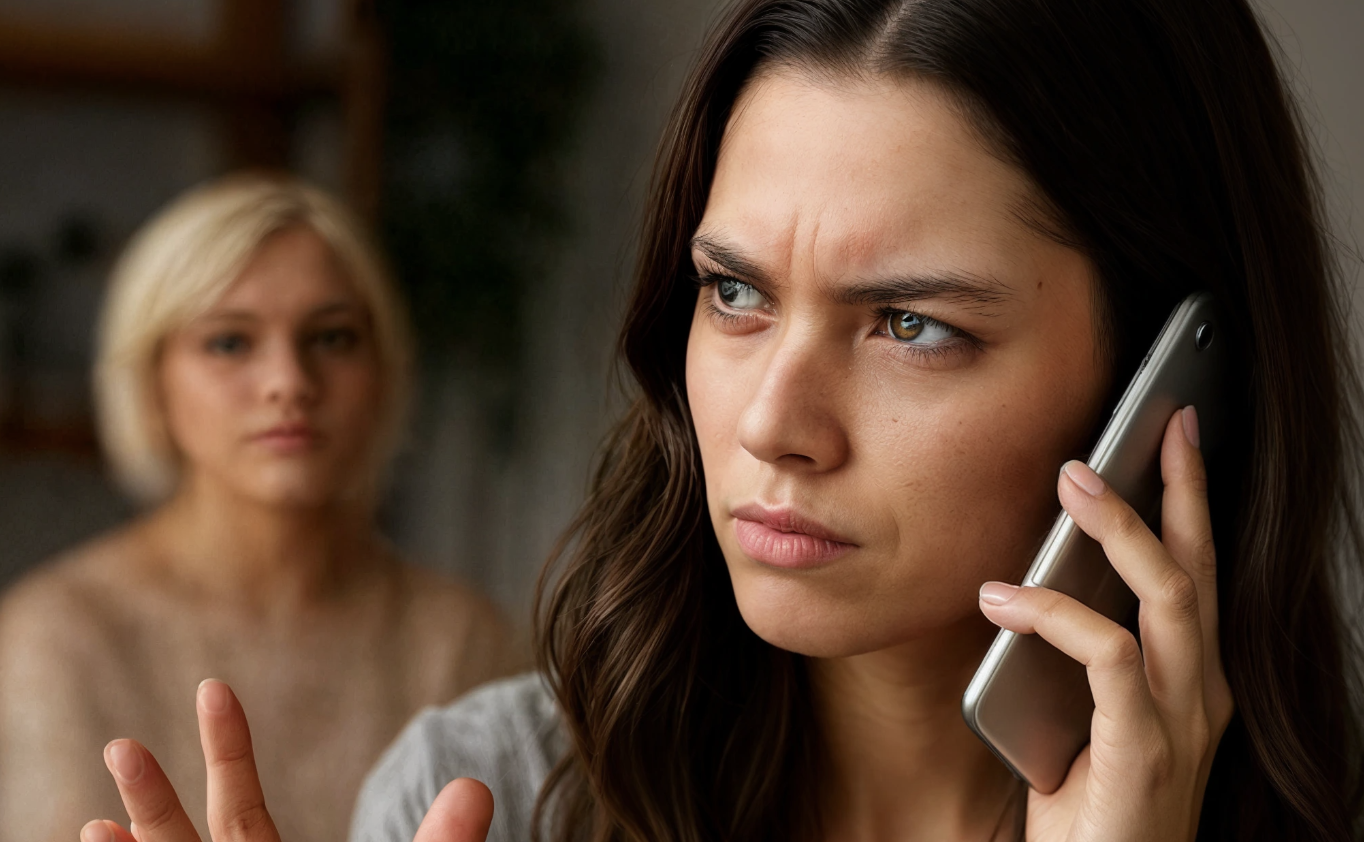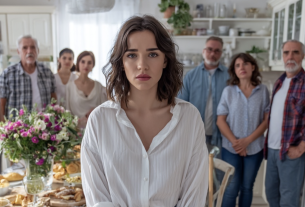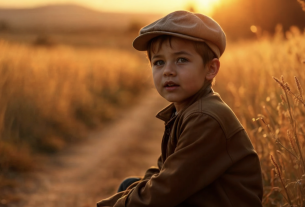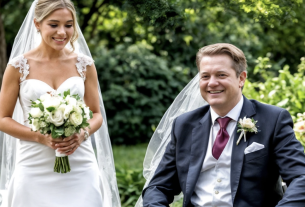“For three years I’ve been divorced from your son, so let his new wife help you now. I won’t lift a finger,” I told my ex-mother-in-law the day before and hung up.
My hands were shaking with anger. Nadezhda Petrovna had already called me three times that week, each time with the same request—to help her with shopping, take her to the clinic, bring her medicines. As if nothing had changed, as if I were still her daughter-in-law, as if that painful divorce from her precious son three years ago had never happened.
In the morning I took my daughter to kindergarten, then poured myself some coffee and sat by the window. A fine October rain was falling outside, and the droplets slid down the glass like the tears I no longer allowed myself to cry. Three years… It felt like an eternity since the day I found out about Igor’s affair.
The phone rang again. I glanced at the screen—an unknown number.
“Hello?”
“Katya, it’s Elena, your Nadezhda Petrovna’s neighbor. Listen, please don’t hang up.”
I recognized the voice. Elena Sergeyevna had lived in the apartment next to my former mother-in-law’s for about twenty years; we sometimes ran into each other at the store.
“What happened?”
“Nadezhda Petrovna is in the hospital. A heart attack. They took her by ambulance last night.”
The world seemed to stop. I automatically set my mug down on the windowsill, and coffee splashed onto the white surface.
“How… how is she?”
“The doctors say it’s serious. She’s still unconscious. Katya, I know you and Igor are divorced, but… she keeps asking for you. Even in her delirium she says your name.”
“And Igor? He should be the one…”
“Igor and his new wife are on vacation. In Turkey. He’s not answering his phone. I found your number in her address book.”
I closed my eyes. I never thought I’d one day be grateful that Nadezhda Petrovna hadn’t crossed my number out of her contacts.
“Which hospital is she in?”
“The Fifth City Hospital, cardiology ward.”
An hour later I was already standing at the hospital entrance. The last time I’d been in the next building over was four years ago, when I gave birth to Dasha. Back then everything was different. Back then Igor stood beside me, holding my hand, and Nadezhda Petrovna brought a huge bouquet of roses and cried with happiness as she looked at her granddaughter through the maternity ward window.
Darya… my four-year-old little girl, who was now peacefully playing in kindergarten. She sometimes asked about Grandma Nadya, even though they hadn’t seen each other for over a year. After the divorce, Nadezhda Petrovna tried to maintain contact—she would come over and bring Dasha gifts. But then Viktoria appeared, Igor’s new wife—young, beautiful, childless. And the visits stopped.
In the cardiology ward I was met by a stern nurse.
“Are you a relative?”
“I…” I hesitated. “I’m her former daughter-in-law.”
“We’re not letting relatives in right now. Only tomorrow morning.”
“Please,” I took out my phone and showed her a photo of Dasha. “This is her granddaughter. We’re the only ones who can come.”
The nurse looked closely at me, then at the photo.
“Ten minutes. No more.”
Nadezhda Petrovna was lying alone in the room, connected to a bunch of wires and tubes. I hadn’t seen her in almost a year, and I was struck by how much she had changed. Her gray hair had turned completely white, her face was gaunt, and her hands on the blanket looked almost transparent.
I sat down on the chair by the bed and took her hand in mine. It was cold and so fragile.
“Nadezhda Petrovna, it’s me, Katya.”
No reaction. Only the steady beeping of the machines and her quiet breathing.
“You know, Dasha asked about you yesterday. She said she misses Grandma Nadya. She wants to show you how she learned to read.”
I wasn’t lying. Darya really did sometimes remember her grandmother, especially when we passed the park where Nadezhda Petrovna loved to push her on the swings.
“You have to get better. Do you hear? Dasha is waiting.”
The next day I came again, this time with Dasha. My daughter was holding a drawing—a bright house with big windows and flowers by the entrance.
“Mama, why is Grandma sleeping?” Dasha whispered, looking at the motionless figure in the bed.
“She’s very tired, sweetheart. But she can hear us.”
Dasha went closer and put the drawing on the bedside table.
“Grandma Nadya, I drew you a little house. It’s pretty, right? And I can read now. Do you want me to read you a story?”
Without waiting for an answer, Darya pulled a book out of my bag and began slowly, syllable by syllable, to read the fairy tale “Kolobok.” Her little voice sounded in the silence of the room, and it seemed to me that Nadezhda Petrovna’s breathing became just a bit more even.
“Mama, why doesn’t Daddy come to see Grandma?” Dasha asked as we were leaving the hospital.
I didn’t know what to say. How do you explain to a four-year-old that her father is enjoying a vacation in Turkey while his mother is dying in a hospital?
“Daddy is far away, honey. He can’t come.”
“And will we keep coming?”
“Yes, we will.”
And we did. Every day. I came in the morning before work, and in the evening I picked Dasha up from kindergarten and we went to the hospital together. Darya would tell her grandma about her day, show her new drawings, sing songs she’d learned at kindergarten.
The doctors said her condition was stably serious. No one could say if she would regain consciousness. But I didn’t give up. Every day I bought fresh flowers, changed the water in the vase, and talked about our lives.
“You know, Nadezhda Petrovna, I got a promotion at work. I’m a lead project manager now. Remember how you said I had a talent for organizing? You were right.”
I talked to her as if she were fully awake, told her the news, shared plans. Sometimes the nurses looked at me with pity, but I paid no attention.
On the fifth day a woman of about forty in a white coat came into the room.
“Are you Ekaterina?”
“Yes.”
“I’m the head of the department, Marina Viktorovna. Tell me, are you really the patient’s former daughter-in-law?”
“Yes, but…”
“You see, usually relatives don’t show this kind of… devotion after a divorce. Especially considering that her son didn’t even bother to come.”
I felt myself blush.
“She treated me well. And Dasha loves her.”
“That’s obvious. You know, I’ve been a doctor for twenty years, and I’ve noticed that patients who are regularly visited feel better. Even in an unconscious state, they somehow sense care.”
“So we can keep coming?”
“Of course. Moreover, I wanted to tell you—this morning we saw the first signs of improvement. Her reaction to light has gotten better.”
My heart began to pound harder.
“That means…”
“It means there’s hope. Keep doing what you’re doing.”
That evening I couldn’t resist and called Igor. He didn’t pick up right away; his voice sounded annoyed.
“Katya? What’s wrong? Is something with Dasha?”
“Dasha is fine. Your mother is in intensive care. A heart attack.”
A long pause. In the background I could hear music and laughter.
“How… serious is it?”
“Very serious. She’s been unconscious for a week.”
“Damn… Katya, I can’t come now. We’re in a five-star hotel in Belek, it cost a fortune…”
“Your mother is dying, Igor.”
“Don’t say that! She’s strong, she’ll pull through. And you… thanks for looking after her. I’ll reimburse all your expenses.”
I hung up before he finished. Expenses… He thinks this is about money.
Many evenings passed. And then came the evening when Nadezhda Petrovna opened her eyes.
I was reading an article from a magazine about parenting to her when I noticed she was looking at me. Not just with open eyes—she was actually looking, clearly conscious.
“Nadezhda Petrovna!” I jumped up from the chair. “Can you hear me?”
She tried to say something, but there was a tube from the ventilator in her mouth. Her eyes filled with tears.
“Don’t try to speak, it’s okay. I’ll call the doctor.”
When the nurse rushed in, Nadezhda Petrovna was still looking at me, not taking her eyes off me. Her hand weakly squeezed mine.
They removed the tube only the next day. The first word she said, in a hoarse voice from the long silence, was:
“Katya…”
“I’m here. It’s okay.”
“Dasha…”
“Dasha is here too, somewhere in the hallway. She came every day and told you stories. Do you want to see her?”
A weak nod.
Darya burst into the room like a whirlwind.
“Grandma Nadya! You woke up! And I thought you were sleeping like Sleeping Beauty!”
Nadezhda Petrovna smiled—the first smile in all those days.
“My… girl…”
Dasha climbed up on the bed and gently hugged her grandmother.
“I have so much to tell you! I learned how to tie my shoelaces! And I learned a poem about autumn! Want to hear it?”
“I do…”
And then Igor appeared in the doorway. Tanned, rested, holding an expensive bouquet of flowers. Behind him stood a young woman, a bit unsure of herself—apparently Viktoria.
“Mom!” Igor walked up to the bed. “How are you feeling? Sorry I didn’t come right away, we were at the seaside when we found out…”
Nadezhda Petrovna looked at her son, then at me. Her expression was strange—not joyful, as I had expected, but somehow assessing.
“Where… were you?” she whispered.
“Well, Mom, I just told you—at the seaside. Vika and I were in Turkey on vacation. As soon as we found out, we flew back.”
“Right away?”
“Almost.” Igor glanced at me awkwardly. “Katya, have you really been coming every day?”
I shrugged.
“Nadezhda Petrovna, we should go,” I said, taking Dasha’s hand. “We’ll see you tomorrow.”
“Katya…” her weak voice stopped me at the door. “Thank you…”
At home Dasha couldn’t fall asleep for a long time.
“Mama, why didn’t Daddy come see Grandma when she was sleeping?”
“He was far away, honey.”
“And we were close?”
“Yes, we were close.”
“And that’s why we came?”
“Yes.”
“Mama, when people are close, they have to help each other, right?”
Out of the mouths of babes… I kissed my daughter on the forehead.
“They have to, Dashenka. They absolutely have to.”
Over the next two weeks, Nadezhda Petrovna steadily got better. We continued to visit her every day. Igor came too, but less and less often. Work, he said, business.
“Katya,” Nadezhda Petrovna said to me once when we were alone, “I need to talk to you.”
“About what?”
“About Igor. About what happened three years ago.”
I tensed up. I didn’t want to remember.
“Nadezhda Petrovna, that’s in the past…”
“No, it’s not in the past. I knew then. About his affair. I knew and kept silent.”
The world froze again. I slowly sat down in the chair.
“You knew?”
“He’s my son, Katya. I gave birth to him, raised him. Do you think a mother can fail to notice when her son has another woman? I saw how he changed, how he started lying, hiding his phone.”
“But you didn’t say anything…”
“I was a fool.” Tears ran down her cheeks. “I thought I was protecting the family. I thought if I ignored the problem, it would solve itself. And then you found out on your own, and everything collapsed.”
I didn’t know what to say.
“Katya, I wronged you. If I had talked to Igor back then, forced him to choose… maybe things would have turned out differently.”
“Maybe,” I said quietly. “Or maybe he still would have chosen her.”
“Perhaps. But I should have tried. For your sake, for Dasha’s. I loved you, but I still betrayed you.”
I took her hand.
“Nadezhda Petrovna, we can’t change the past. But you’re alive now, and we’re here. That has to mean something, doesn’t it?”
“It does. Katya… after Igor got married the second time, I stopped coming to see you. I thought it was the right thing to do—not to interfere, not to cause problems with Viktoria. But I missed you. I missed you and Dasha. You can’t imagine how much.”
“And I thought you just… forgot about us.”
“Never. I thought about you every day. And when the doctors say I called your name in my delirium… it’s true. I called the only person who, I knew, wouldn’t abandon me.”
My eyes filled with tears.
“But I didn’t come right away. When you called, I didn’t want to go.”
“And then you did. That matters more.”
We sat in silence, holding hands.
“Katya, I want to ask you for something.”
“What is it?”
“Don’t deprive me of my granddaughter. Please. I know I have no right to ask, but… Dasha is all I have left from that life when we were a family.”
“Nadezhda Petrovna…”
“And one more thing. I want to change my will. I have an apartment, a dacha, some savings. I want to leave everything to Dasha. Igor… he has a new family now, a new wife. And Dasha… she is my granddaughter, and she should know that her grandmother didn’t forget her.”
“There’s no need…”
“There is. I want to make things right.”
I was too choked up to speak.
“You’ll get better. We still have a lot of time ahead of us.”
“Maybe. But a heart attack is a warning. At my age, there may not be a second chance.”
When they discharged her from the hospital, I brought her home with me. “Just for a little while,” I said, until she was fully back on her feet. But we both understood she could stay as long as she wanted.
“Katya,” Igor called a week later. “What’s going on? Mom says she’s living with you.”
“Is that a problem?”
“That’s not the point… it’s just strange. We’re divorced.”
“You and I are divorced, Igor. Not your mother and me.”
“But Vika doesn’t understand…”
“Would Vika like to take care of a sick mother-in-law?”
A pause.
“Well… she’s not used to that. Her mother is still young.”
“I see. Don’t worry, I’ll manage.”
And I did. Nadezhda Petrovna recovered quickly, helped around the house, took walks with Dasha, read her stories. In the evenings we had tea and talked—about life, plans, Dasha’s future.
“You know, Katya,” she said once, “only now do I understand what a real family is.”
“What is it?”
“It’s when people are there for each other not because they have to, but because they can’t do otherwise. You didn’t have to come to the hospital. You could have said, ‘She’s not my relative, not my problem.’ But you came. And you brought Dasha. Because you couldn’t do otherwise.”
“You’re not a stranger to me.”
“On paper, I am. Officially, I’m nobody to you. But you acted like a daughter. No, better than a daughter. I know families where the children don’t show this much care for their elderly parents.”
I thought of Igor and his seaside vacation.
“It just turned out that way.”
“It didn’t just ‘turn out.’ You chose. And I’m grateful to you for that.”
A month later, a notary came to our place. As she’d promised, Nadezhda Petrovna changed her will. All her property was left to Dasha.
“Are you sure?” the notary asked. “What about your son?”
“My son has everything he needs. And my granddaughter will live in my apartment.”
That same evening Igor called. His voice was indignant.
“Katya, what is this? Mom changed her will in favor of Dasha?”
“That’s her right.”
“What do you mean, her right? I’m her only son! I’ll prove to any judge that the ex-daughter-in-law is manipulating an elderly woman!”
“Igor, calm down. No one manipulated anyone. Your mother is of sound mind and made her own decision.”
“She’s under your influence! Katya, I get that you want money, but this is wrong.”
I looked out the window. In the yard, Nadezhda Petrovna was playing with Dasha in the sandbox.
“You know what, Igor? When your mother was in intensive care, I wasn’t thinking about money. When she was learning to walk again after the heart attack, I wasn’t thinking about inheritance. When Dasha read her fairy tales every evening—we weren’t thinking about a will. We just loved her.”
“And what, I don’t love my mother?”
“I don’t know. You tell me—where were you when she was dying?”
A long pause.
“I didn’t know…”
“You did. I called you. And you were having fun in Turkey.”
“Katya…”
“Igor, your mother is alive. She’s healthy. We’re happy. If you want to be part of her life—you’re welcome. If not—don’t interfere with ours.”
I hung up and realized that for the first time in three years, I felt truly free.
In the evening, after Dasha fell asleep, I sat in the kitchen having tea with Nadezhda Petrovna.
“Do you regret it?” she asked.
“Regret what?”
“Getting involved with me. With a sick old woman who gets in the way of your personal life.”
I laughed.
“When I was married to your son, I had a mother-in-law. Now I have a mom. Feel the difference?”
Her eyes filled with tears.
“Thank you, daughter.”
“No, thank you. For teaching me that family isn’t a stamp in a passport. It’s the choice to stay by someone’s side every day.”
Outside, the first snow was falling. Tomorrow Dasha would definitely want to build a snowman. And Nadezhda Petrovna and I would stand at the window, drinking hot tea and watching our child play.
Ours. Because family is the people who are there when it matters. The ones who come to the hospital every day. The ones who read fairy tales and build snowmen. The ones who didn’t lift a finger three years ago—but are ready to reach out a hand today.
Family is a choice. And we’ve made ours



